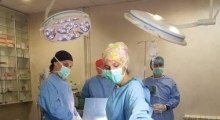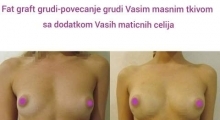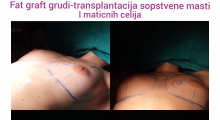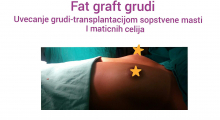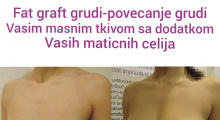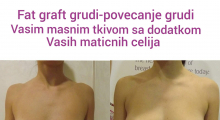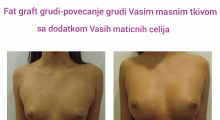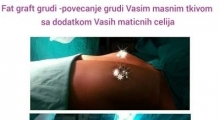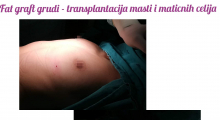Fat grafting breast augmentation
Fat grafting is a surgical procedure for breast enhancement with your own fat tissue. The price includes examinations and pre-operation analyses: Internal medical analysis, X-ray of the lungs, complete blood count, bra, one-night stay in hospital. The surgery is performed by Dr Velisa Arsic, plastic, aesthetic and reconstructive surgeon.
What is this surgery?
What is this surgery?
Fat transfer breast augmentation essentially uses liposuction to take fat from other parts of your body and inject it into your breasts. This is a breast augmentation option for women who are looking for a relatively small increase in breast size and would prefer natural results. Women who don’t want a foreign body, i.e., silicone implants, most often choose this operation.
Fat tissue is usually taken from the belly, hips or buttocks, processed into liquid and injected into breasts. The technique Dr Arsic performs includes taking excessive fat tissue from certain areas, and processing it, so that liquid and the fat cells which were damaged in the process of liposuction would be removed. This, clean fat tissue, is then injected into breasts with thin 1 cc syringes. Using these cannulas means the shape of the breasts can be controlled better. This technique results in excellent revitalization of the injected fat cells, which diminishes the necessity of multiple interventions.
Up to 300 cc can be injected into each breast per one procedure.
Fat tissue is usually taken from the belly, hips or buttocks, processed into liquid and injected into breasts. The technique Dr Arsic performs includes taking excessive fat tissue from certain areas, and processing it, so that liquid and the fat cells which were damaged in the process of liposuction would be removed. This, clean fat tissue, is then injected into breasts with thin 1 cc syringes. Using these cannulas means the shape of the breasts can be controlled better. This technique results in excellent revitalization of the injected fat cells, which diminishes the necessity of multiple interventions.
Up to 300 cc can be injected into each breast per one procedure.
What is preparation for the surgery?
Before scheduling your surgery, you are supposed to do the following analyses and bring your results with you:
1. Blood type
We need a document where your blood type is stated. The surname in the document MUST be the same as the surname in your ID.
We need a document where your blood type is stated. The surname in the document MUST be the same as the surname in your ID.
2. Laboratory analyses (not older than two weeks):
· Complete blood count - erythrocytes, leukocytes, platelets, hemoglobin, hematocrit, iron, sedimentation
· Biochemical parameters - urea, creatinine, glucose, bilirubin, alkaline phosphatase, transaminases (AST and ALT), electrolytes (potassium, sodium chlorides)
· Coagulation parameters - APTT, prothrombin time and INR
· Urine sediment
The most common reason for canceling the planned surgery is a bad result of some of these analyses.
For this reason, we insist that you do these laboratory analyses and send them to us before coming to the surgery.
The price of the operation includes preoperative preparation: digital X-ray of the lungs, examination by a radiologist, examination by a cardiologist, EKG and examination by an anesthesiologist. These tests are done in our hospital.
All possible, necessary additional analyses, e.g. breast ultrasound or thyroid hormone tests, will be charged separately and are not included in the price.
Preoperative preparation is charged only in the event of cancellation or delay of surgery.
For this reason, we insist that you do these laboratory analyses and send them to us before coming to the surgery.
The price of the operation includes preoperative preparation: digital X-ray of the lungs, examination by a radiologist, examination by a cardiologist, EKG and examination by an anesthesiologist. These tests are done in our hospital.
All possible, necessary additional analyses, e.g. breast ultrasound or thyroid hormone tests, will be charged separately and are not included in the price.
Preoperative preparation is charged only in the event of cancellation or delay of surgery.
What type of anesthesia is used for the surgery?
Analgosedation, or local anesthesia with sedoanalgesia.
What shouldn’t I worry about after the surgery?
Swelling, pain in the form of pressure on your chest, bruises.
After what time can I go home?
You will stay in hospital for 24 hours after the surgery.
How should I behave after the surgery?
You need to strictly follow our instructions and avoid physical activities like exercises and heavy lifting for at least two months.
After what time can I return to normal daily activities?
Usually after one week.
Gallery
Monday-Friday from 09-20h
Saturday from 09-15h
Opšta Bolnica Analife
Skadarska 5
(Zemun), Beograd




